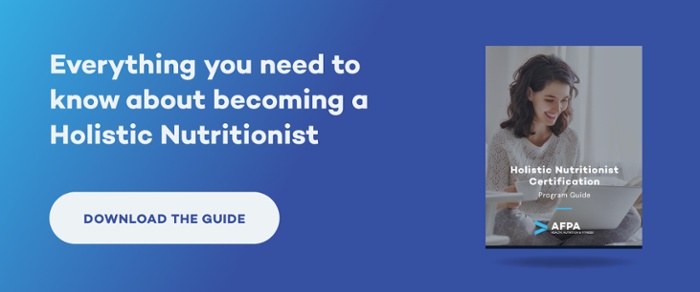Whether you’ve been passionate about nutrition for years or you’re considering adding nutritional insight to your health coaching or fitness training career, nutrition school can be the educational boost you need.
But not all programs are the same when it comes to curriculum, cost, time commitment and other factors. If you’re pondering whether the move is right for you, and how to take the first steps, here are some questions you should think about:
1. Why do you want to learn about nutrition?
This seems like a basic question, but it’s one that some nutrition students forget to ask. Really pinning down your reason can help to determine which type of program works best for you. For example, do you want to help people lose weight? Or are you more interested in designing diet and lifestyle programs that address disease and optimize health? Although both may bring similar outcomes for clients, it’s important to pinpoint your “why” from the start.
Become a Certified Holistic Nutritionist Online in 6 Months or Less
2. What’s your schedule?
There are numerous nutrition courses out there, ranging from online videos to in-person classes. For many already in the coaching and training fields, it can be difficult to pursue robust nutrition education while still seeing clients and meeting family commitments. If that’s the case, you may want to consider a program that fits into your schedule and offers flexibility. There are options available that don’t require any travel and can be done at your own pace, within a specified timeframe.
3. What’s the format?
Anyone can learn about nutrition at “Google University,” but simply surfing around the web reading random studies and sites doesn’t create a very comprehensive educational foundation. Instead, look for a program that has an established educational track and fits your preferred learning method. That will give you more well-rounded nutritional knowledge.
4. Are certifications or credentials available?
If you’re planning on using your knowledge to help clients, it’s very helpful to enroll in a program that results in some type of credential, like a degree or certification. These allow you to establish credibility, particularly if you move to a new employer.
5. How much does it cost?
This can be a more complex question than it seems. First, there’s the “sticker price” of a program, but you need to investigate whether there are fees and added costs involved. For example, a program that requires in-person workshops a few times in a year will mean travel expenses like hotel and flights, as well as workshop materials if needed. If there’s no travel and the program price doesn’t include fees, do some projections about your return on investment. How long will it take you to “earn back” the program cost through taking on nutritional clients? This answer will vary widely, but you shouldn’t have to wait years to pay off your education.
For many, nutrition education is a major, positive step toward learning about healthy eating — not just for potential clients, but also for yourself. It’s an exciting field that’s likely to keep growing in popularity as people gravitate toward fresher, personalized meal planning. But before you leap, just make sure it’s the right step for you, and know which path you want to take from here.




